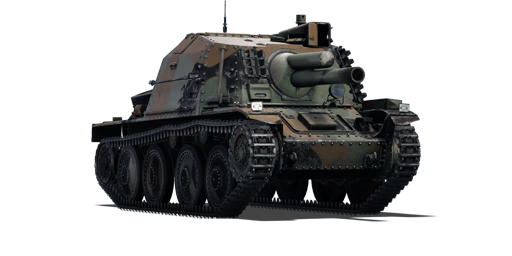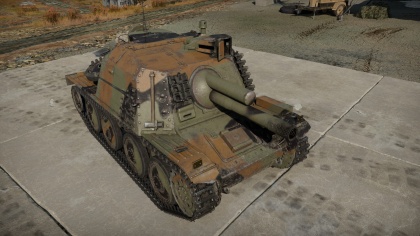Difference between revisions of "Sav m/43 (1946)"
(→Ammo racks) (Tag: Visual edit) |
(→Main armament) (Tag: Visual edit) |
||
| Line 76: | Line 76: | ||
The heavier shells also result in a relatively long loading time compared to the 1944 model's 75 mm field gun. | The heavier shells also result in a relatively long loading time compared to the 1944 model's 75 mm field gun. | ||
| + | |||
| + | One interesting quirk of the gun is that it is not mounted onto the vehicle pointing directly forward. In fact, the gun is, by default, pointing around 15° to the left, giving it more horizontal traverse to that side. | ||
{| class="wikitable" style="text-align:center" width="100%" | {| class="wikitable" style="text-align:center" width="100%" | ||
Revision as of 15:39, 16 October 2020
Contents
| This page is about the Swedish tank destroyer Sav m/43 (1946). For other uses, see LT-38 (Family). |
Description
The Stormartillerivagn m/43 (1946) is a rank II Swedish tank destroyer
with a battle rating of 3.0 (AB/RB/SB). It was introduced in Update 1.97 "Viking Fury".
The Sav m/43 (1946) is essentially identical to the Sav m/43 (1944) with the important exception of the gun: instead of the 75 mm field gun, it features a 105 mm howitzer.
General info
Survivability and armour
The Sav m/43 (1946) has up to 50 mm of armour in front, which is capable of deflecting shots if angled, but should not be relied on. It should be noted that the engine deck is only 10 mm thick, and can be penetrated by aircraft heavy machine guns and cannon. The side armour is only 15 mm thick at most, and can also be penetrated quite easily by heavy machine guns and autocannon fire.
Due to the cramped crew compartment and scattered ammunition within the compartment, any penetration by a shell is likely to cause critical damage to multiple modules and/or crew members.
Armor Composition:
- Rolled Homogeneous Armor
- Cast Homogeneous Armor
- Structural Steel
- Structural Steel of Chassis
- Tracks
- Gun Steel
| Armour | Front (Slope angle) | Sides | Rear | Roof |
|---|---|---|---|---|
| Hull | 50 mm (24°) Crew Compartment
30 mm (64°) Upper Glacis 50 mm (15°) Lower Glacis 15 mm (61°) Lower Plate (Between L. Glacis and Belly) |
13 mm Crew Compartment
15 mm Lower Hull |
13 mm Crew Compartment
15 mm Engine Compartment |
13 mm Crew Compartment
10 mm Engine Compartment |
| Mantlet | 50 mm (Rounded) | |||
Notes:
- Tracks and Suspension - 15 mm
- Main Gun - 25 mm
- Fenders - 4 mm
Mobility
| Game Mode | Max Speed (km/h) | Weight (tons) | Engine power (horsepower) | Power-to-weight ratio (hp/ton) | |||
|---|---|---|---|---|---|---|---|
| Forward | Reverse | Stock | Upgraded | Stock | Upgraded | ||
| Arcade | 45 | 7 | 12 | 202 | 305 | 16.83 | 25.42 |
| Realistic | 41 | 6 | 142 | 160 | 11.83 | 13.33 | |
The Sav m/43 is based on the chassis of the Strv m/41 and thus has a similar level of mobility. It is considerably heavier, however, and thus correspondingly more sluggish. While the forward top speed is adequate, the reverse speed is quite poor, making it hard to retreat.
Armaments
Main armament
The 1946 model of the Sav m/43 now features the 10,5 cm kan m/44, a 105 mm howitzer. It starts off with the very inadequate slpprj m/44 APBC round. This round lacks the penetration or post-penetration damage to be competitive against the tanks the Sav m/43 faces; thus, it is of the utmost importance that the psgr m/49 HEAT shell is unlocked as soon as possible. This round has an amazing 240 mm of penetration, the most of any round available to any Rank II tank in the game, and also has substantial post-penetration effects. There is also an HE round available that is effective against light vehicles and armour.
The shells all have a relatively low muzzle velocity, and it can therefore be quite hard to hit moving targets at long range. Conversely, the substantial arc of the shell trajectories due to the low-velocity shells allows the Sav m/43 to sometimes hit targets hiding behind cover, or to fire from behind cover itself.
The heavier shells also result in a relatively long loading time compared to the 1944 model's 75 mm field gun.
One interesting quirk of the gun is that it is not mounted onto the vehicle pointing directly forward. In fact, the gun is, by default, pointing around 15° to the left, giving it more horizontal traverse to that side.
| 105 mm Kan m/44 | Turret rotation speed (°/s) | Reloading rate (seconds) | |||||||||||
|---|---|---|---|---|---|---|---|---|---|---|---|---|---|
| Mode | Capacity | Vertical | Horizontal | Stabilizer | Stock | Upgraded | Full | Expert | Aced | Stock | Full | Expert | Aced |
| Arcade | 41 | -14°/+20° | -20°/+15° | N/A | 7.00 | 9.75 | 11.84 | 13.09 | 13.93 | 13.0 | 11.5 | 10.6 | 10.0 |
| Realistic | 4.80 | 5.60 | 6.80 | 7.52 | 8.00 | ||||||||
Ammunition
| Penetration statistics | |||||||
|---|---|---|---|---|---|---|---|
| Ammunition | Type of warhead |
Penetration @ 0° Angle of Attack (mm) | |||||
| 10 m | 100 m | 500 m | 1,000 m | 1,500 m | 2,000 m | ||
| psgr m/49 | HEAT | 240 | 240 | 240 | 240 | 240 | 240 |
| sgr m/34 LT | HE | 23 | 23 | 23 | 23 | 23 | 23 |
| slpprj m/44 | APBC | 67 | 65 | 57 | 49 | 42 | 36 |
| Shell details | |||||||||
|---|---|---|---|---|---|---|---|---|---|
| Ammunition | Type of warhead |
Velocity (m/s) |
Projectile Mass (kg) |
Fuse delay (m) |
Fuse sensitivity (mm) |
Explosive Mass (TNT equivalent) (g) |
Ricochet | ||
| 0% | 50% | 100% | |||||||
| psgr m/49 | HEAT | 425 | 10.25 | N/A | 0.1 | 1,615 | 62° | 69° | 73° |
| sgr m/34 LT | HE | 475 | 11.67 | 0.1 | 0.1 | 1,820 | 79° | 80° | 81° |
| slpprj m/44 | APBC | 475 | 11.67 | N/A | N/A | N/A | 48° | 63° | 71° |
Ammo racks
| Full ammo |
1st rack empty |
2nd rack empty |
3rd rack empty |
4th rack empty |
5th rack empty |
6th rack empty |
7th rack empty |
8th rack empty |
Visual discrepancy |
|---|---|---|---|---|---|---|---|---|---|
| 41 | 40 (+1) | 30 (+11) | 27 (+14) | 23 (+18) | 15 (+26) | 7 (+34) | 4 (+37) | 1 (+40) | None |
Optics
| Sav m/43 (1946) Optics | ||
|---|---|---|
| Default magnification | Maximum magnification | |
| Main Gun optics | X1.8 | X3.5 |
| Comparable optics | ___ | |
Usage in battles
Like the preceding 1944 model, the Sav m/43 (1946) performs best in hull down positions, as it can use the gun depression to present a steeper angle on the frontal armour to increase its effective thickness. However, it commonly faces tougher opposition at this BR, including the very common T-34, M4A1, and Pz.IV F2 medium tanks, thus the armour should not be depended on in a slugging match against these tanks.
Conversely, the 240 mm penetration on the HEAT round is capable of dealing with anything the Sav m/43 can encounter, even the heaviest of tanks. Hitting accurately with the low velocity shells will take practice, but since HEAT shells do not lose penetration with distance, the Sav m/43 is capable of crippling or destroying even the heaviest tanks at long range.
The side and rear armour is very thin (10-15 mm), and is very vulnerable to even heavy machine gun and autocannon fire. Exposing it to the enemy will lead to a quick demise, especially against the extremely common .50 cal M2 heavy machine gun found on a lot of American tanks.
Modules
| Tier | Mobility | Protection | Firepower | ||
|---|---|---|---|---|---|
| I | Tracks | Parts | Horizontal Drive | ||
| II | Suspension | Brake System | FPE | Adjustment of Fire | psgr m/49 |
| III | Filters | Crew Replenishment | Elevation Mechanism | ||
| IV | Transmission | Engine | |||
Pros and cons
Pros:
- Extremely high penetration HEAT round
- Decent frontal armour
- Good gun depression
- Decent mobility once fully upgraded
Cons:
- Low velocity shells that are difficult to hit with at long range
- Very thin side, roof, and rear armour, especially the engine deck
- Useless stock APBC solid shot
- Poor reverse speed
History
In March of 1940, Sweden ordered about 90 TNH tanks (known as the Panzer 38(t) in German service) from ČDK, but Germany, which had occupied Poland in 1938, confiscated the tanks for its own use as the Panzer 38(t) Ausf. S. Sweden still needed the light tanks, and after negotiations the Swedish manufacturer Scania-Vabis was allowed to produce them under license, and compensation for the lost tanks. Sweden ordered 116 Strv M/41 SI in June, 1941, and in June of 1942 Sweden ordered 122 Strv M/41 SII. The last 18 Strv M/41 SII were built as the Sav M/43 in 1944. Another 18 Sav M/43 were purpose-built afterwards. The Sav M/43 was a casemate assault gun made by removing the turret of the Strv M/41, and adding a casemate superstructure, initially housing a 75 mm gun. The 75 mm gun was replaced by a 105 mm M/44 Bofors cannon. The Sav M/43 served in artillery units until 1951, when they were given to armored units instead. They served until 1973.
Media
- Skins
- Videos
See also
Links to the articles on the War Thunder Wiki that you think will be useful for the reader, for example:
- reference to the series of the vehicles;
- links to approximate analogues of other nations and research trees.
External links
Bibliography
- Stormartillerivagn m/43. (2020, March 6). In Wikipedia. https://en.wikipedia.org/w/index.php?title=Stormartillerivagn_m/43&oldid=944240648
- Moore, Craig. (2016, September 9). Sormartillerivagn m/43. Tank Encyclopedia. https://tanks-encyclopedia.com/ww2/sweden/stormartillerivagn-m43-105mm-spg.php
| Sweden tank destroyers | |
|---|---|
| Strv m/41 derivatives | Spj fm/43-44 · Sav m/43 (1944) · Sav m/43 (1946) · Pvkv II · Pvkv III |
| Ikv 72/103 | Ikv 72 · Ikv 103 |
| Pvkv m/43 | Pvkv m/43 (1946) · Pvkv m/43 (1963) |
| ATGM | UDES 33 · Pbv 302 (BILL) · Pvrbv 551 |
| Other | SAV 20.12.48 · Bkan 1C |
| Norway | VIDAR |





